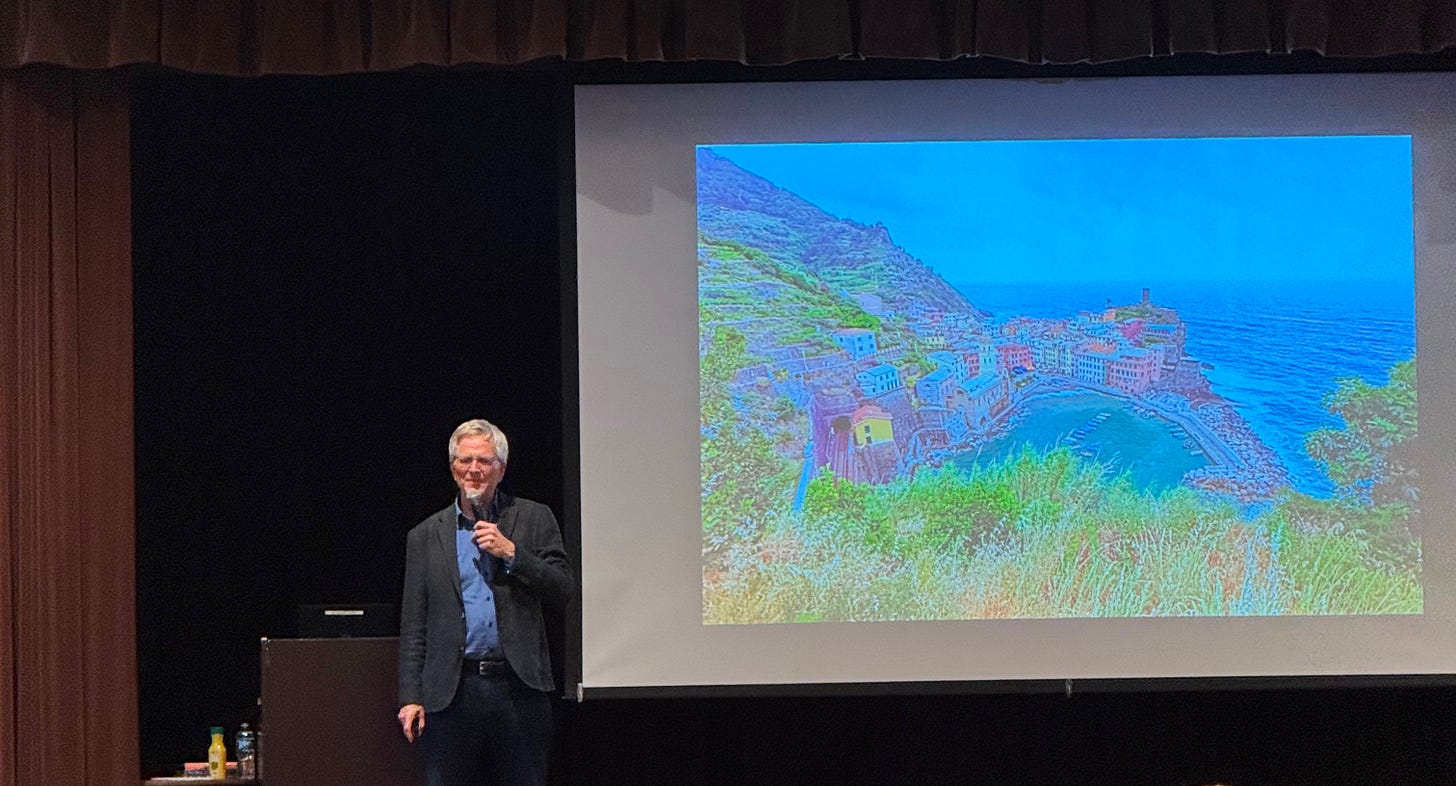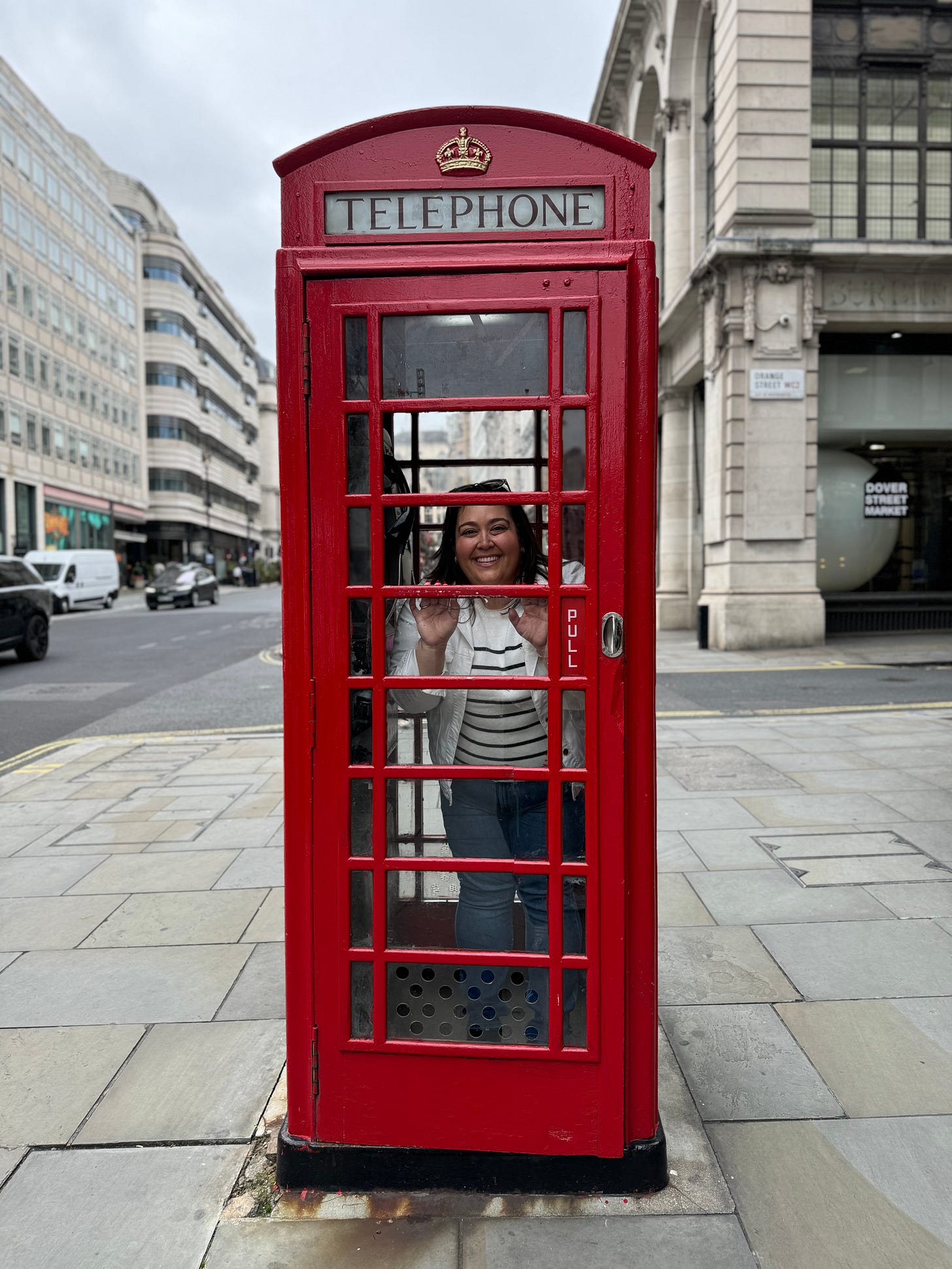Consider this your reminder to support your local library 🥰
In the last few years, my library system has created a series called A Slice of Literary Orange. (I live in Orange County, thus the fun name!)
This program hosts a variety of authors from across all genres to serve as keynote speakers. The coolest part? Desipte being the smallest (by area) county in California, there have been some big freaking names. Oh, and because libraries are *the best*, they are all totally free events.
Anyway, I recently attended one of these events and saw a face all too familiar to anyone who grew up in a PBS household like I did, Rick Steves.1
For anyone unfamiliar, Rick has been hosting the TV show, Rick Steves’ Europe, for 25 years and has created a travel resource empire — continuously developing endless guidebooks, tours, and even luggage for travelers.
One of the best elements of Rick’s persona (as confirmed IRL) is that he adores local culture and seeks to become fully immersed in it as he explores. This approach speaks to my soul.
Whenever I travel, my singular goal is to blend into the place I’m visiting to the point of being asked for directions in a language I don’t understand.
I was so drawn into Rick’s presentation for Literary Orange that I furiously scribbled down a few great anecdotes.
For starters, he described visiting small towns in Ireland as an excellent option for many English-speaking Americans because you “have the sensation of understanding a foreign language.” The room roared with laughter, and I’m giggling again, just rewriting it.
It turns out that Rick has fantastic comedic timing ~and~ a deep knowledge of European architecture.
However, the real takeaway from that evening came in two parts:
“Assume you’re interesting” and “Carbonate the experience”
These nuggets arose as Rick highlighted the beautiful moments of making friends (or at least acquaintances) with locals.
I fully related to the joy of befriending people while traveling.
If you’ve been here a minute, you may recall that I wrote about chatting up my neighbor on a flight to London last year. Sure, maybe not a local — is anyone a “local” over international waters?—but the same concept applies.
Fun fact: On a trip to Spain, I made friends in the hotel pool, of all places (it was August…siesta time was often spent there), with a remarkably well-traveled Dutch mother and her adult son. We still exchange messages a few times a year!
Indeed, as a part-time extrovert and full-time storyteller, I love connecting with locals and fellow foreigners when traveling. I want the inside scoop!
Where are you from? Where have you been? What have you seen? What did you eat?
TELL. ME. EVERYTHING!
Transparently, despite writing this newsletter, I have a bit of impostor syndrome with Rick’s advice to assume you’re interesting.
However, I love the idea that if you can muster the courage to be an extrovert for even a few minutes, you can infuse (*carbonate*) your travel experience with a uniqueness that will keep the memory of your trip buoyant in your mind for years to come.
Some of my favorite travel moments have bubbled up (this carbonation metaphor has legs, right?) because I pushed through the hesitation rooted in the fear of judgment and reached out anyway.
A little C’est La Vie energy is required. You have to say, “It’s entirely possible this person may think I’m annoying/insane/etc,” but then shrug your shoulders and do it anyway.

In the days that followed his presentation, as I noodled on this great piece of travel advice from our good buddy Rick, it occurred to me that the same concepts are required for writing.
One of the key components to any great book (or other piece of writing) is relatability. That experience when readers see themselves mirrored on the page or screen and say, “YES! That’s just like me!”
In order to achieve that moment (as my writing mentor always says), you must write like nobody is looking over your shoulder.
Write down the real-life stuff without concern for how others perceive the message. Later editing stages may rein things in if needed, but don’t self-edit the depth before it has a chance to land on the page.
In other words, write with the assumption that what you’re saying is interesting. Then, carbonate the sh*t out of the words you’re drafting. Go big or go home.

As I make progress on my second manuscript, I keep reminding myself to dive into authenticity and include the messy parts. The beauty of writing something purely fictional, with minimal real-life influence, is that there are fewer limits to the story's plot. Lived experiences don’t have to inhibit my creativity.
So, it’s time to crack open those experiences like a piñata and see what fascinating storylines rain down.
How are you writing forward with carbonation? How do you keep relatability at the forefront of your story? Let me know in the comments!
Until next time,
Megan
My PBS-heavy household undoubtedly explains why I’m secretly a 90-year-old woman trapped in a Millennial’s body, and I’m okay with that.





I'm fairly new to your stack and am loving it. Is your first book already in the world? Best wishes with your second!
I'm a HUGE Rick Steves/PBS/NPR fan as well.
Love this approach to travel and writing!